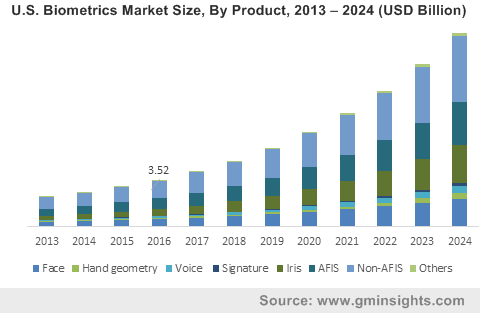North America biometrics market to contribute prominently toward the global share by 2024, Strategic partnerships to outline the competitive landscape
Publisher : Fractovia | Published Date : 2016-11-02Request Sample
Biometrics market has already established its significant presence across the security landscape in a bid to combat the increasing instances of data theft, security breaches, and data hacking. Organizations are increasingly demanding for authentication solutions that not only offer reliable security but also are extremely difficult to hack. Biometrics technology is one such solution that arguably fits into all these conditions, subject to the fact that this technology is basically based on statistical analysis of biological data. Biometrics authenticate individuals based on the physiological or behavioral characteristics such as identifiers, face recognition, DNA, palm veins, iris recognition, etc. As per Global Market Insights, Inc., biometrics industry is forecast to surpass USD 50 billion by 2024. The speculated figure is almost quadruple of its market valuation in 2016 recorded at USD 12 billion, which is deemed to be a positive indicator for the overall business growth.
U.S. Biometrics Market Size, By Product, 2013 – 2024 (USD Billion)

The increasing accessibility of smartphones along with a significant expansion of consumer electronics sector over the recent years have been the major factors proliferating the global biometrics market trends. The advent of technology has enabled biometric identification in smartphones for identification of the owner during unlocking the device as well as during making payment, which unquestionably provides additional handset security. Apple Inc, the technology conglomerate, is considered to be one of the precursors in the biometrics market, driving fingerprint recognition in consumer electronics. The introduction of Touch ID fingerprint recognition system in their advanced iPhone series is profoundly a major breakthrough in the overall biometrics industry dynamics. Reportedly, the tech giant is soon to bring another groundbreaking innovation in the landscape with the launch of advanced facial recognition system in their upcoming edition (iPhone 8), that is claimed to be much more secured and faster than the present Touch ID fingerprint reader.
The integration of biometrics in BFSI sector to enable safer transactions and payments is further allowing better penetration of biometrics industry. In this regard, Apple’s mobile payment service, Apple Pay has been gaining a humongous popularity. Launched in 2014, this new category of payment service actually integrates individual’s fingerprints with NFC antenna technology for payment authentication of purchased goods. A couple of banks including Bank of America, Wells Fargo, Capital One Bank, and American Express have incorporated biometrics in their mobile banking apps for authentication purpose.
Favorable regulatory landscape has significantly driven North America biometrics market. Biometric applications in security and government sectors of U.S. are driving the regional market trends. In fact, statistics claim, North America with U.S. at the helm will represent more than 30% of the overall biometrics industry share by 2024. Asia Pacific will also turn out to be another lucrative belt witnessing a remarkable growth. Several governmental initiatives in China and India like CRIC (China Resident Identity Card), UIDAI Aadhar enrollment program emphasizes on logging through biometric technology for ensuring authenticated and secured identification of the individuals. Implementation of these programs has profoundly favored the commercialization of biometrics industry in APAC.
Global biometrics industry is rather fragmented with some of the prominent players including NEC Corporation, CMI Time Management, M Cogent, BIO-Key International, and Lockheed Martin having a established foothold in this business space. Strategic partnership is the major growth tactic adopted by the market players to establish a strong hold in the competitive landscape. The recent teaming up of Chinese medicine maker, Tong Ren Tang with Iris ID is one such evidence of business expansion where the latter is reported to provide iris scanners for Tong Ren Tang. In another instance, DMI has entered a strategic collaboration with U.S. based NEC Corporation to integrate NEC’s advanced biometric technology in DMI’s mobile platform to ensure national security, federal civilian technology priorities, and public safety under the American government legislation. With security coming out as one of the fundamental aspects across myriad domains as commercial, consumer electronics, residential etc., it is certain that biometrics market will carve a profitable roadmap in the years ahead.